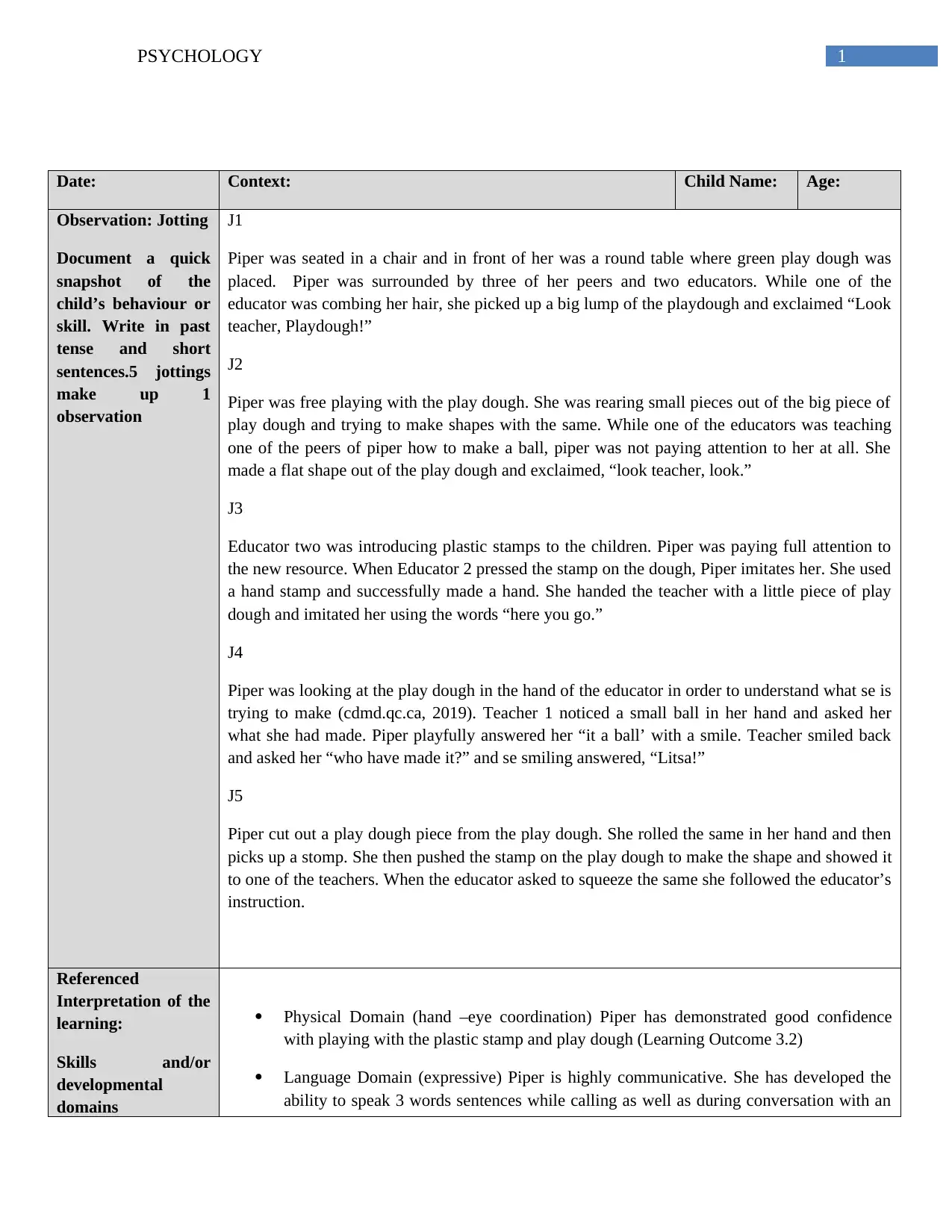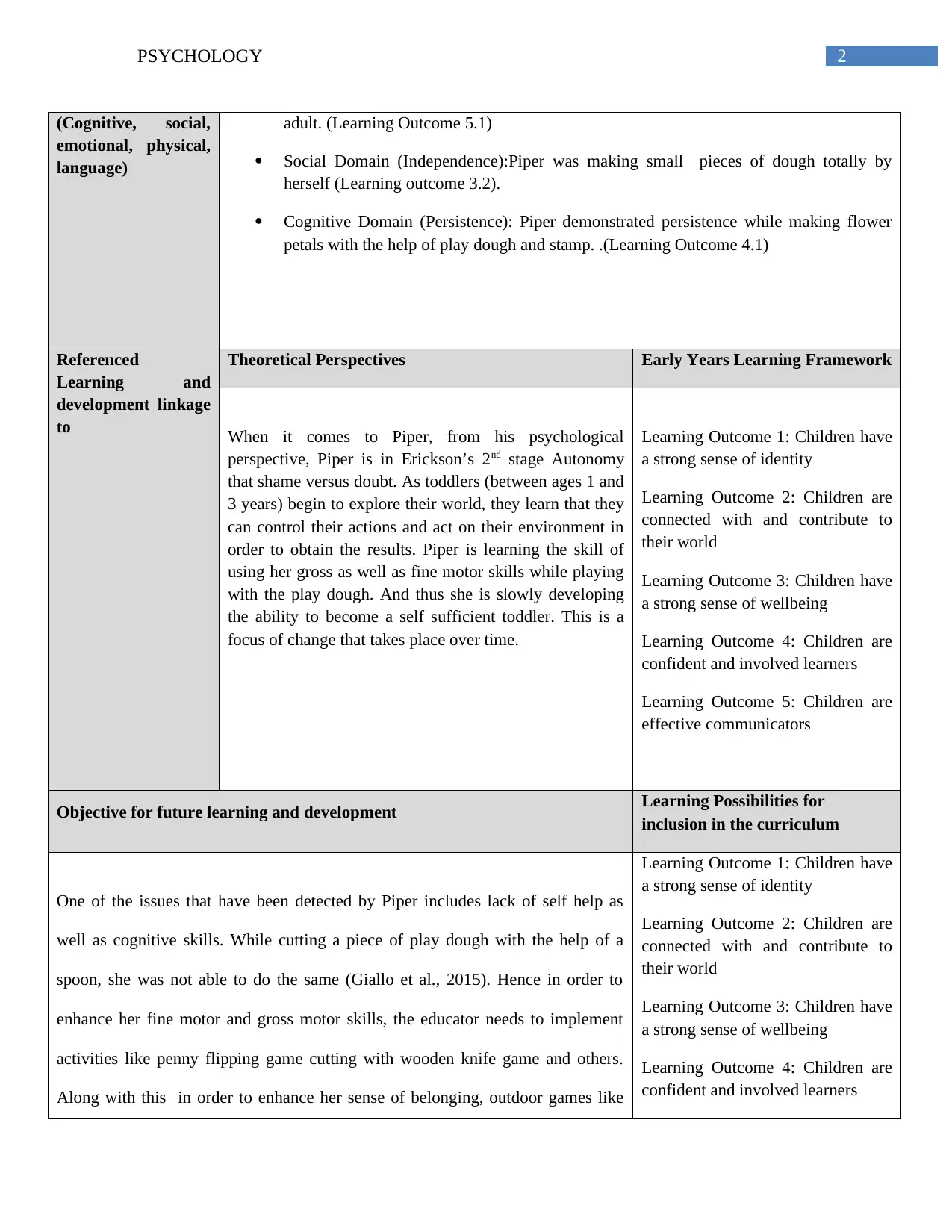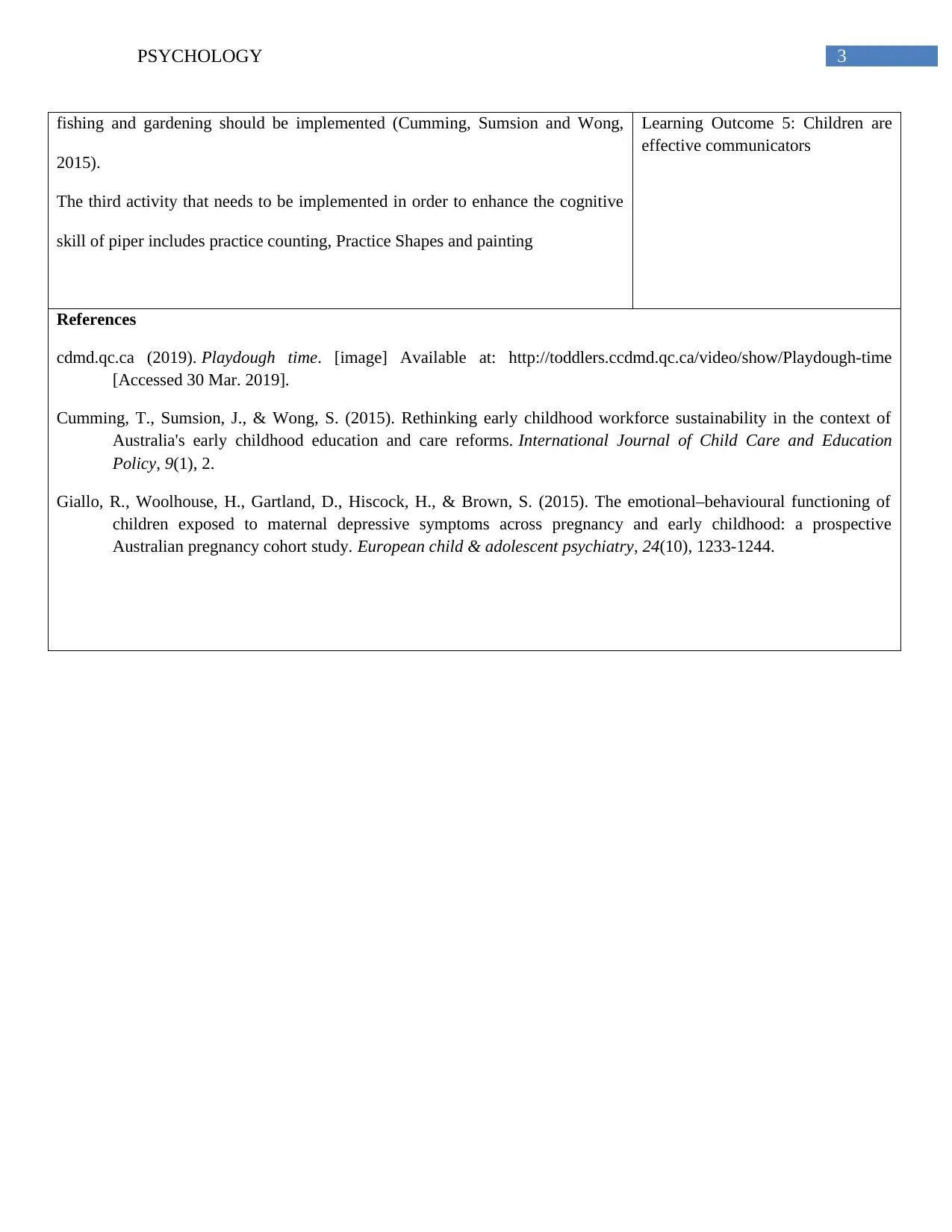Psychology Assignment: Child Observation and Development Analysis
VerifiedAdded on 2023/01/11
|4
|1068
|78
Practical Assignment
AI Summary
This psychology assignment presents an observation and analysis of a child named Piper, detailing her interactions and behaviors during playdough activities. The assignment documents five observational jottings, capturing Piper's actions, language, and social interactions. It interprets Piper's skills and developmental domains, including physical, language, social, and cognitive aspects, and links these observations to theoretical perspectives, specifically Erikson's stages of psychosocial development. The assignment further connects the observations to the Early Years Learning Framework, outlining learning outcomes. Finally, it identifies areas for future learning and development, proposing curriculum inclusions like activities to enhance fine and gross motor skills, cognitive skills and sense of belonging, supported by relevant academic references.

Running head: PSYCHOLOGY
Psychology
Name of the Student
Name of the University
Author Note
Psychology
Name of the Student
Name of the University
Author Note
Paraphrase This Document
Need a fresh take? Get an instant paraphrase of this document with our AI Paraphraser

1PSYCHOLOGY
Date: Context: Child Name: Age:
Observation: Jotting
Document a quick
snapshot of the
child’s behaviour or
skill. Write in past
tense and short
sentences.5 jottings
make up 1
observation
J1
Piper was seated in a chair and in front of her was a round table where green play dough was
placed. Piper was surrounded by three of her peers and two educators. While one of the
educator was combing her hair, she picked up a big lump of the playdough and exclaimed “Look
teacher, Playdough!”
J2
Piper was free playing with the play dough. She was rearing small pieces out of the big piece of
play dough and trying to make shapes with the same. While one of the educators was teaching
one of the peers of piper how to make a ball, piper was not paying attention to her at all. She
made a flat shape out of the play dough and exclaimed, “look teacher, look.”
J3
Educator two was introducing plastic stamps to the children. Piper was paying full attention to
the new resource. When Educator 2 pressed the stamp on the dough, Piper imitates her. She used
a hand stamp and successfully made a hand. She handed the teacher with a little piece of play
dough and imitated her using the words “here you go.”
J4
Piper was looking at the play dough in the hand of the educator in order to understand what se is
trying to make (cdmd.qc.ca, 2019). Teacher 1 noticed a small ball in her hand and asked her
what she had made. Piper playfully answered her “it a ball’ with a smile. Teacher smiled back
and asked her “who have made it?” and se smiling answered, “Litsa!”
J5
Piper cut out a play dough piece from the play dough. She rolled the same in her hand and then
picks up a stomp. She then pushed the stamp on the play dough to make the shape and showed it
to one of the teachers. When the educator asked to squeeze the same she followed the educator’s
instruction.
Referenced
Interpretation of the
learning:
Skills and/or
developmental
domains
Physical Domain (hand –eye coordination) Piper has demonstrated good confidence
with playing with the plastic stamp and play dough (Learning Outcome 3.2)
Language Domain (expressive) Piper is highly communicative. She has developed the
ability to speak 3 words sentences while calling as well as during conversation with an
Date: Context: Child Name: Age:
Observation: Jotting
Document a quick
snapshot of the
child’s behaviour or
skill. Write in past
tense and short
sentences.5 jottings
make up 1
observation
J1
Piper was seated in a chair and in front of her was a round table where green play dough was
placed. Piper was surrounded by three of her peers and two educators. While one of the
educator was combing her hair, she picked up a big lump of the playdough and exclaimed “Look
teacher, Playdough!”
J2
Piper was free playing with the play dough. She was rearing small pieces out of the big piece of
play dough and trying to make shapes with the same. While one of the educators was teaching
one of the peers of piper how to make a ball, piper was not paying attention to her at all. She
made a flat shape out of the play dough and exclaimed, “look teacher, look.”
J3
Educator two was introducing plastic stamps to the children. Piper was paying full attention to
the new resource. When Educator 2 pressed the stamp on the dough, Piper imitates her. She used
a hand stamp and successfully made a hand. She handed the teacher with a little piece of play
dough and imitated her using the words “here you go.”
J4
Piper was looking at the play dough in the hand of the educator in order to understand what se is
trying to make (cdmd.qc.ca, 2019). Teacher 1 noticed a small ball in her hand and asked her
what she had made. Piper playfully answered her “it a ball’ with a smile. Teacher smiled back
and asked her “who have made it?” and se smiling answered, “Litsa!”
J5
Piper cut out a play dough piece from the play dough. She rolled the same in her hand and then
picks up a stomp. She then pushed the stamp on the play dough to make the shape and showed it
to one of the teachers. When the educator asked to squeeze the same she followed the educator’s
instruction.
Referenced
Interpretation of the
learning:
Skills and/or
developmental
domains
Physical Domain (hand –eye coordination) Piper has demonstrated good confidence
with playing with the plastic stamp and play dough (Learning Outcome 3.2)
Language Domain (expressive) Piper is highly communicative. She has developed the
ability to speak 3 words sentences while calling as well as during conversation with an

2PSYCHOLOGY
(Cognitive, social,
emotional, physical,
language)
adult. (Learning Outcome 5.1)
Social Domain (Independence):Piper was making small pieces of dough totally by
herself (Learning outcome 3.2).
Cognitive Domain (Persistence): Piper demonstrated persistence while making flower
petals with the help of play dough and stamp. .(Learning Outcome 4.1)
Referenced
Learning and
development linkage
to
Theoretical Perspectives Early Years Learning Framework
When it comes to Piper, from his psychological
perspective, Piper is in Erickson’s 2nd stage Autonomy
that shame versus doubt. As toddlers (between ages 1 and
3 years) begin to explore their world, they learn that they
can control their actions and act on their environment in
order to obtain the results. Piper is learning the skill of
using her gross as well as fine motor skills while playing
with the play dough. And thus she is slowly developing
the ability to become a self sufficient toddler. This is a
focus of change that takes place over time.
Learning Outcome 1: Children have
a strong sense of identity
Learning Outcome 2: Children are
connected with and contribute to
their world
Learning Outcome 3: Children have
a strong sense of wellbeing
Learning Outcome 4: Children are
confident and involved learners
Learning Outcome 5: Children are
effective communicators
Objective for future learning and development Learning Possibilities for
inclusion in the curriculum
One of the issues that have been detected by Piper includes lack of self help as
well as cognitive skills. While cutting a piece of play dough with the help of a
spoon, she was not able to do the same (Giallo et al., 2015). Hence in order to
enhance her fine motor and gross motor skills, the educator needs to implement
activities like penny flipping game cutting with wooden knife game and others.
Along with this in order to enhance her sense of belonging, outdoor games like
Learning Outcome 1: Children have
a strong sense of identity
Learning Outcome 2: Children are
connected with and contribute to
their world
Learning Outcome 3: Children have
a strong sense of wellbeing
Learning Outcome 4: Children are
confident and involved learners
(Cognitive, social,
emotional, physical,
language)
adult. (Learning Outcome 5.1)
Social Domain (Independence):Piper was making small pieces of dough totally by
herself (Learning outcome 3.2).
Cognitive Domain (Persistence): Piper demonstrated persistence while making flower
petals with the help of play dough and stamp. .(Learning Outcome 4.1)
Referenced
Learning and
development linkage
to
Theoretical Perspectives Early Years Learning Framework
When it comes to Piper, from his psychological
perspective, Piper is in Erickson’s 2nd stage Autonomy
that shame versus doubt. As toddlers (between ages 1 and
3 years) begin to explore their world, they learn that they
can control their actions and act on their environment in
order to obtain the results. Piper is learning the skill of
using her gross as well as fine motor skills while playing
with the play dough. And thus she is slowly developing
the ability to become a self sufficient toddler. This is a
focus of change that takes place over time.
Learning Outcome 1: Children have
a strong sense of identity
Learning Outcome 2: Children are
connected with and contribute to
their world
Learning Outcome 3: Children have
a strong sense of wellbeing
Learning Outcome 4: Children are
confident and involved learners
Learning Outcome 5: Children are
effective communicators
Objective for future learning and development Learning Possibilities for
inclusion in the curriculum
One of the issues that have been detected by Piper includes lack of self help as
well as cognitive skills. While cutting a piece of play dough with the help of a
spoon, she was not able to do the same (Giallo et al., 2015). Hence in order to
enhance her fine motor and gross motor skills, the educator needs to implement
activities like penny flipping game cutting with wooden knife game and others.
Along with this in order to enhance her sense of belonging, outdoor games like
Learning Outcome 1: Children have
a strong sense of identity
Learning Outcome 2: Children are
connected with and contribute to
their world
Learning Outcome 3: Children have
a strong sense of wellbeing
Learning Outcome 4: Children are
confident and involved learners
⊘ This is a preview!⊘
Do you want full access?
Subscribe today to unlock all pages.

Trusted by 1+ million students worldwide

3PSYCHOLOGY
fishing and gardening should be implemented (Cumming, Sumsion and Wong,
2015).
The third activity that needs to be implemented in order to enhance the cognitive
skill of piper includes practice counting, Practice Shapes and painting
Learning Outcome 5: Children are
effective communicators
References
cdmd.qc.ca (2019). Playdough time. [image] Available at: http://toddlers.ccdmd.qc.ca/video/show/Playdough-time
[Accessed 30 Mar. 2019].
Cumming, T., Sumsion, J., & Wong, S. (2015). Rethinking early childhood workforce sustainability in the context of
Australia's early childhood education and care reforms. International Journal of Child Care and Education
Policy, 9(1), 2.
Giallo, R., Woolhouse, H., Gartland, D., Hiscock, H., & Brown, S. (2015). The emotional–behavioural functioning of
children exposed to maternal depressive symptoms across pregnancy and early childhood: a prospective
Australian pregnancy cohort study. European child & adolescent psychiatry, 24(10), 1233-1244.
fishing and gardening should be implemented (Cumming, Sumsion and Wong,
2015).
The third activity that needs to be implemented in order to enhance the cognitive
skill of piper includes practice counting, Practice Shapes and painting
Learning Outcome 5: Children are
effective communicators
References
cdmd.qc.ca (2019). Playdough time. [image] Available at: http://toddlers.ccdmd.qc.ca/video/show/Playdough-time
[Accessed 30 Mar. 2019].
Cumming, T., Sumsion, J., & Wong, S. (2015). Rethinking early childhood workforce sustainability in the context of
Australia's early childhood education and care reforms. International Journal of Child Care and Education
Policy, 9(1), 2.
Giallo, R., Woolhouse, H., Gartland, D., Hiscock, H., & Brown, S. (2015). The emotional–behavioural functioning of
children exposed to maternal depressive symptoms across pregnancy and early childhood: a prospective
Australian pregnancy cohort study. European child & adolescent psychiatry, 24(10), 1233-1244.
1 out of 4
Your All-in-One AI-Powered Toolkit for Academic Success.
+13062052269
info@desklib.com
Available 24*7 on WhatsApp / Email
![[object Object]](/_next/static/media/star-bottom.7253800d.svg)
Unlock your academic potential
Copyright © 2020–2026 A2Z Services. All Rights Reserved. Developed and managed by ZUCOL.


